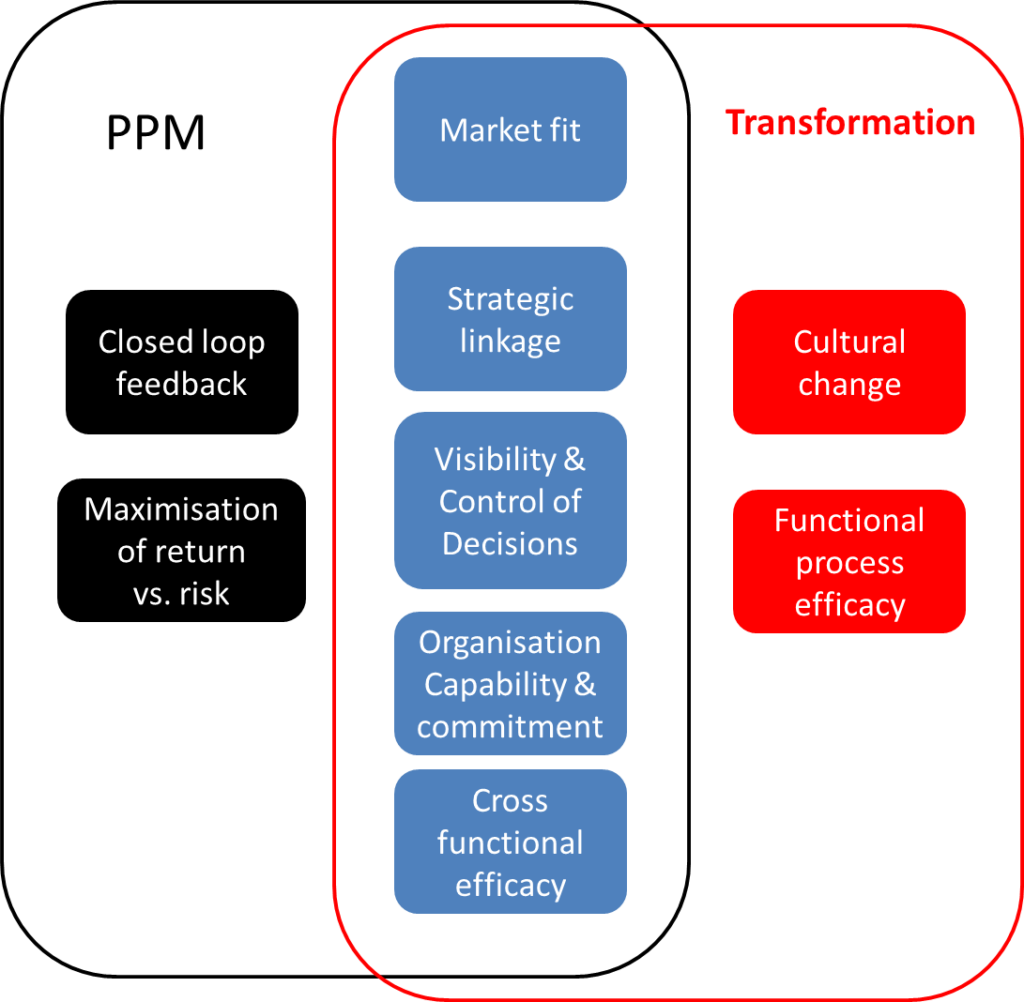Business transformation is a much bandied term these days and in practice is often used to cover business change activities. This article is to make some comparisons between the goals & activities of transformation against those of a product portfolio planning and management process.
First, a reasonable definition of product portfolio management (PPM):
The process by which business strategy is converted into a product roadmap which delivers corporate goals and optimally utilises the business’ product making and marketing abilities in relation to the market opportunity.
Next, a couple of definitions for business transformation (BT):
- Business transformation is about making fundamental changes in how business is conducted in order to help cope with a shift in market environment.
- Business Transformation is a change management strategy which has the aim to align People, Process and Technology initiatives of a company more closely with its business strategy and vision.
In summary then, business transformation is an external market and business strategy driven process with the goal of creating change in the organisation to enable it to execute the business strategy and align it to compete in the new market reality. This is now sounding rather like the definition for product portfolio management…
So, are there any real differences between business transformation & PPM?
- Transformation scope covers situations where major cultural change is required
- PPM builds upon reasonably well working functional processes. Functional competence needs to be in good enough order for PPM e.g. functional capacity planning
- PPM has built-in “closed loop” feedback to adapt and sustain in the face of continued change as opposed to transformation which is about initiating & driving a big change
- PPM generates risk/return options for business decision e.g. between long and short term gain and taking technology risk or market risk or a balance of both.
If we were to try and make an analogy of personal health to these two approaches then business transformation “treatment” might be required in the most extreme situations to shock the patient to help them survive and then guide them toward a more healthy way of living. By contrast, PPM might be seen as a combined exercise and dietary approach which avoids the risk of extreme intervention and helps the person achieve their best health and fitness.
Personal reflection
In my own experience of working for a large corporate (Nokia) over many years, I have seen both transformations in action and then also contributed toward the formalisation of product portfolio management. My perception would be:
- The transformations galvanised the organisation into “change mode” and caused for example the creation of new business units with unique missions
- Whilst the initial phases of the transformation mostly bore fruit in line with their mission, often the nature of the transformation challenge could make the timing of the first fruit quite unpredictable
- Real value was only generated further through the transformation. This might be partly attributed to the benefits of the learning curve but the main value transition was co-incident with product portfolio management practices becoming bedded in
- The big value add of PPM was in its ability to hedge both technology risk through different delivery paths to market and market risk through an offering of mainstream and niche/discovery products.
I am interested to hear other views from others on PPM vs. business transformation, but for today, I am an advocate for benefits of PPM and indeed our company offers the Portgenie PPM framework to those interested in learning more.
References
[1] https://en.wikipedia.org/wiki/Business_transformation
[2] https://rapidbi.com/what-is-business-transformation-3/
[3]”Leading Change, Why Transformations Efforts Fail”, John P. Kotter, Harvard business Review.

